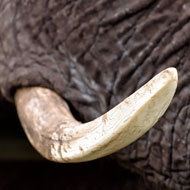Calls to close Japan’s domestic ivory market

Under current laws, ivory businesses are regulated but trade between individuals is not, unless tusks are involved.
Conservationists are calling for the closure of Japan’s domestic ivory market, as it emerges there is a growing trend for visitors to purchase ivory for illegal export.
A new report by the wildlife trade monitoring network, TRAFFIC, shows “without doubt” that Japan’s largely unregulated domestic ivory market is contributing to illegal trade.
TRAFFIC carried out surveys and interviews in in both physical and online markets in Japan from May to September this year. Covert interviews with ivory vendors found that 73 per cent were actively promoting purchases that lead to illegal ivory exports - even giving advice on how best to conceal ivory products with permits in luggage.
One of the report’s authors, Tomomi Kitade, said: “It is imperative that Japan’s role within international illegal ivory trade be recognised, and urgent steps taken to address the on-going illegal export and the regulatory gaps that are facilitating such criminal activity.”
Evidence also shows online platforms are being used to purchase worked ivory products, with a recent seizure by China’s customs authority, when 1,639 pieces of worked ivory and carved tusks.
Under current laws, ivory businesses are regulated but trade between individuals is not, unless tusks are involved.
Commenting on the findings, Gavin Edwards, conservation director of WWF Hong Kong: “This evidence acts as a timely reminder of the urgent need to shut down legal ivory markets which are exacerbating illegal trade.”
China’s legal ivory trade is set to close on 31 December. WWF and TRAFFIC are using Japan and other key countries to close their legal ivory trades, which China is set to do on 31 December.
Commenting on the findings, Gavin Edwards, conservation director of WWF Hong Kong: “This evidence acts as a timely reminder of the urgent need to shut down legal ivory markets which are exacerbating illegal trade.
“Regular travellers are likely to continue buying ivory and evidence suggests some ivory markets are gearing up to target Chinese tourists. We must quash this trend. With an average of 55 elephants poached daily for ivory, we simply can’t let ivory markets remain open.”



 The BSAVA has opened submissions for the BSAVA Clinical Research Abstracts 2026.
The BSAVA has opened submissions for the BSAVA Clinical Research Abstracts 2026.